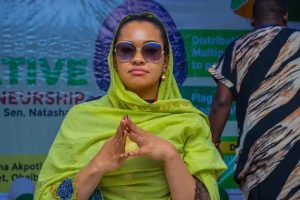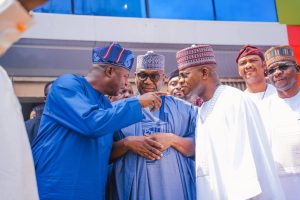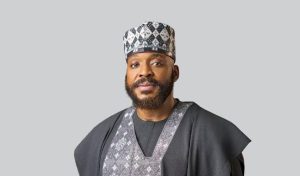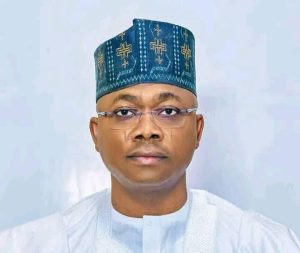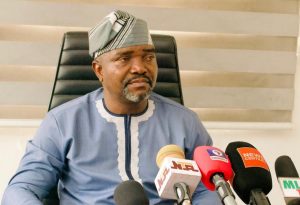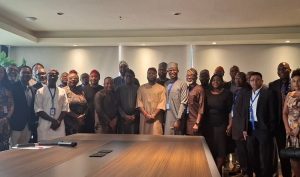Yahaya Bello: Hope! – By Sam Aina
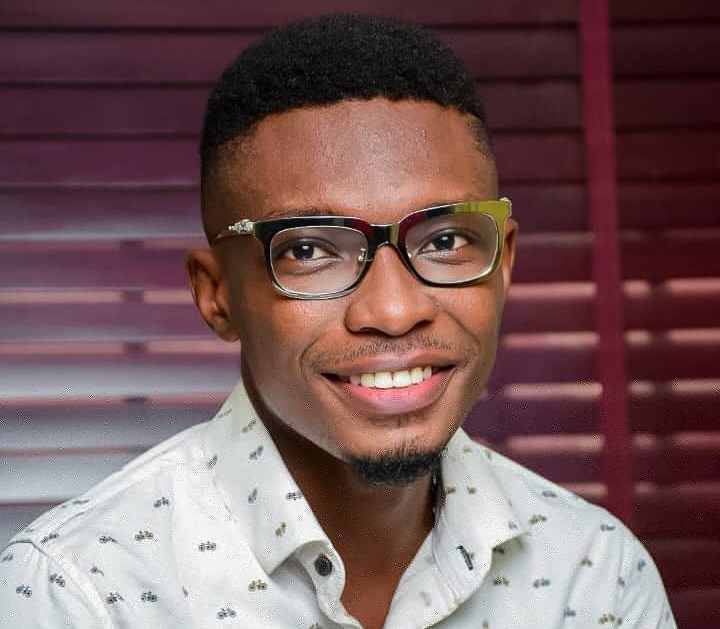
If you have no belief in Nigeria as a country, then you probably should not read this.
I love Nigeria. I love her people, her culture, and her beautiful, rich expanse of land. I love everything about us as a people. We are probably the funniest set of people on earth, with the highest set of a driven, technologically savvy, youthful population. Every Nigerian comes with a default attitude that propels us to do well wherever we go to. Nigerians have the sauce. We have the juice. We demonstrate our uniqueness all around the world with a certain ease and panache.
Whenever I see something astounding about a black man doing amazing things in academics, Hollywood, Engineering, and other sectors across the world, the first thought that comes to my mind is that the person is Nigerian or has Nigerian heritage. I am almost always right.
We are special.
The question is, why everywhere but home?
I’ll start with a story.
Growing up, and I am sure many of you can relate, in Agricultural class, we were asked to plant a single seed of bean in a wrap of sachet water, popularly called “pure water”. We were told by our Agricultural teacher in Primary school to find a portion of the soil, fill the sachet halfway and water it every morning for a week. The assignment was termed a success if you returned the sachet a week later, harboring at its center a greenish, fresh beanstalk.
I went home, took a bean seed, went to the verandah of my house, and filled the sachet halfway as directed. I inserted the seed of the bean into the soil I had fetched and poured some water, placing it on an elevated surface on the verandah so it could get some sun. Every morning during that week before leaving for school, I would look inside eagerly, expecting to see something green emerging. It did not help that almost all my friends and classmates had some exciting thing to say about their project, whilst my bean seed, rather stubbornly, refused to germinate.
After a few days, I told my mother, rather dejectedly, that I had failed at the assignment I was given. I explained all I had been doing, and the result thereof. She comforted me and asked me to fetch the sachet for her supervision. As soon as I brought the sachet to her, she started laughing, rather hysterically. I was young, pained, and confused, yet my mother, who was supposed to comfort me, was laughing at the project I had invested four days in.
I had filled the sachet with sandy soil, with many of the particles so big, it rejected growth. She removed some of the stones and staring back at us, rather innocently, was my bean seed. She took the same seed, filled the sachet with some good, soft soil, and watered it accordingly. Needless to say, when I took the assignment to school the next Monday, it had, although smaller than others, the appearance of a greenish stalk emerging.
Do you understand the parable?
The sachet is Nigeria. The seed is the potential of the Nigerian people, especially her thriving youth population. The soil, which has been quite stony for a long time, is what we have to work with, which has prevented us from progressing as a country and a people. The soil is made up of big, stony particles such as tribalism, religious disunity, class divide, insecurity, and a blatant disregard for the rule of law by the same people who are supposed to “serve and protect”.
This is the story of Nigeria. Who my Mother represents in this emerging tale will soon become evident to all.
Nigeria, the giant of Africa, harbors so much potential. Sometimes I sit and think about all that we could be doing with our human and capital resources and feel a pang of regret. We are not supposed to be where we are at this moment, and though saddening, to say the least, the universe has always created an opportunity for perpetual optimists such as myself to hope.
For some of us, Nigeria remains the only place where we will ever feel accepted and loved, and for the larger percentage of people, it remains the only place they can live because they cannot afford to move somewhere else. It comes to me as a surprise when I see young Nigerians looking for any opportunity to malign our country abroad. I ask myself if they have another country of origin. Does the situation at home not affect their chances as an immigrant in other countries?
If Nigeria does not develop and produce better people, no matter where you run to, the stigma will step in the door before your intelligence and skill have a chance to show themselves.
This is why Nigeria has to work.
A few weeks ago I realized that all we need, as a country and a people, is hope. The hope that we can one day have a country devoid of hatred, insecurity, and tribal strain. A country where Nigerians coexist regardless of their religious inclinations and gender. A country where intra-tribal marriages are regarded as the norm, and the law enforcement agencies actually enforce the law. A country that understands the demands of the younger generation, and does not employ every tactic to frustrate what they do not understand. A country and a people we can call “ours”.
I came to this realization when I witnessed, first-hand, the caliber of people who traveled from far and wide to participate in the 46th Birthday Celebration of the Governor of Kogi State, Alhaji Yahaya Adoza Bello. Bello, who is currently the youngest Governor in Nigeria, used the opportunity of the celebration of his birth to pull some of Nigeria’s most revered names into the Confluence city of Lokoja for a symposium titled “Insecurity in Nigeria and the role of the youth”.
Here were Nigerians from different tribes and all works of life speaking as one, professing solutions to problems and hoping against hope that the words they uttered would one day become a day-to-day happenstance. Prominent Nigerians such as the Ooni of Ife, Oba Adeyeye Ogunwusi Ojaja II, and many others contributed from their depth of wisdom, promulgating an idea of a Nigeria that will mirror that which they had come to associate with the new Kogi. An inquisitive mind would ask, “what exactly did they see in Kogi to warrant such praise?”
Kogi, situated at the center of Nigeria, is a tough place to rule, perhaps the toughest State to govern in Nigeria. It is so because whoever rules has to deal with the idiosyncrasies of over 30 tribes and their different cultures. Its position at the center of Nigeria also serves as a major passway for millions of traveling Nigerians every year. It is estimated that over 20 Million Nigerians pass through Kogi State annually, making it, presumably, a sumptuous ground for criminals to conduct their activities.
To add insult to injury, instead of maximizing Kogi’s enormous potential in the mineral and human sector, past leaders had neglected all these and instead, spent their time looting her scarce resources and massaging the egos of people who appealed to the disposition of the benefits of segregation. Pre-2016, people simply coexisted in a confined space in Kogi. There was no love lost between all the tribes in the state, with her leaders adding fuel to the fire for their selfish political gain.
A simple psychological manipulation.
After all, if one tribe is convinced that other tribes within the state do not have their best interests at heart, they would do anything to stop the emergence of anyone apart from their tribe atop the much-coveted seat of power. They would become paranoid, and paranoia, as it always turns out to be, is the root of evil deeds. Within ten years, countless lives were lost to this illogical line of thought, and the people only grew further and further apart.
All these assured, for the most part, the combination of a political delicacy that had just too much spice for a new cook. A reoccurring issue with no end in sight.
Until Bello.
Yahaya Bello has often neglected the thousands of Kilometers of constructed roads across the state, hundreds of thousands of building blocks that have served as the bedrock of an infrastructural revolution, Billions of Naira spent on revolutionizing the health and educational sector, several hundreds of street lights that have illuminated the capital city and many other projects that should naturally inspire praise to cite the unifying atmosphere that he has created amongst all the tribes in the state as his biggest win yet. It is rare, yet commendable, to see that in this day and age where some prefer to rule with the “divide and conquer” rhetoric, there remains hope for our dear nation, Nigeria.
He stepped into one of the most divided states in Nigeria, and in one full sweep, brought all Muslims, Christians, and Traditional worshippers; Igalas, Okuns, and Ebiras alongside many other tribes; Men and Women, Old and young to the table.
The panelists on that day were no strangers to Kogi State, which makes them the best mouths from which the true story could be told. As they highlighted, Kogi, as often postulated, is a true mirror of the Nigerian State. It had, in the past, suffered drastically from the same issues that have befallen the Nigerian state in her entirety, while bearing, rather glaringly, the same ingredients that have made for a lot of displeasure amongst Nigerian home and abroad. Bello came in with the gait of one for whom a challenge was familiar territory, and has never looked back.
The buzz that accompanies the electioneering season is already gathering speed, and typical of Nigeria and her people, the selfishness that follows the thought process behind who ought to rule our country has started to bear its fangs from those whose duty it is to seek for the best for our people.
Less than two weeks ago, some Southern Governors gathered to deliberate on pressing National issues, and after hours of discussion, held a press conference to announce what they had concluded on. Amongst many other things, they announced with gusto how they, a group of fewer than fifteen people, had decided that Nigeria’s next leader should emerge from the South. Perfectly plausible for a group whose desire remains selfish, devoid of the knowledge of history and the clarity of current issues facing every square of the country.
Nigeria, by 2023, would have had Southerners occupy both the Presidential and Vice Presidential seats for a combined period of 24 years. They have heralded some of Nigeria’s most fruitful periods and some of the most turbulent periods in Nigerian democratic history, which begs a pertinent question.
What has tribe got to do with good leadership?
Martin Luther King once said that “We are not makers of history, we are made by history.” It is nothing against Southerners or Northerners, Easterners or Westerners, but Nigeria’s history should teach even the most uneducated of humans that competency must hold a higher ranking in the choice for leadership; instead of tribal or religious inclination. Since Nigeria’s creation, many have ruled from all of these places, yet Nigeria’s core problems remain steadfast like yesterday’s Fufu, further dividing what is left of our country.
2023 is closer than we all can imagine, and the choice of the typical Nigerian must revolve around those who have the empathy and drive to unite Nigerians of all tribes as one. For the first time in Nigeria’s history, almost every Nigerian seems to be dissatisfied with the entity called Nigeria. Moving forward, it is far more important keeping the people together than to give false promises, and as fate would have it, historical evidence has shown that it is impossible to give what one does not have.
Yahaya Bello has all that we need.
Whilst other leaders have aligned with the aggrandizement that has often accompanied leadership in Nigeria, Yahaya Bello continues to blaze the trail with his people-oriented style of governance. For the first time in the history of Nigerian politics, a Nigerian politician has emerged who happens to tick all the right boxes.
Whilst we have had some leaders in the past who have had empathy, they have not been firm. Whilst others have been firm, they have not been gender-sensitive. Whilst some have been gender-sensitive, they have not employed the attitude of embracing the different cultures and religions that should be synonymous with a country harboring within her bosom over 300 tribes.
Yahaya Bello has displayed all these and more, creating within many a glimmer of hope. A simple insight into his appointments, manner of distribution of infrastructural projects, and the firmness with which he has been able to keep a state that is supposed to be the hub of criminality safe is a source of astonishment to many. Bello’s odyssey from the bespectacled, 40-year old newbie in 2016 to the assured, dynamic leader that has shifted Kogi State’s fortunes for the better should be a course of study in many institutions.
Platitudinous to say the least, but Bello has shown that he is the solution to Nigeria’s problems.
Yahaya Bello gives us, the younger generation, the audacity to hope for a Nigeria where we will not have to worry about division, insecurity, or lack. Yahaya brings in his stride a promise of peace, tranquility, and prosperity. Yahaya Bello will if given the chance, herald the start of an age which the Nigerian dream has always depended on.
Kogi was never the destination, Nigeria is.
Hope has gotten him thus far, I would count on it to lead him the rest of the way.
Shalom.

